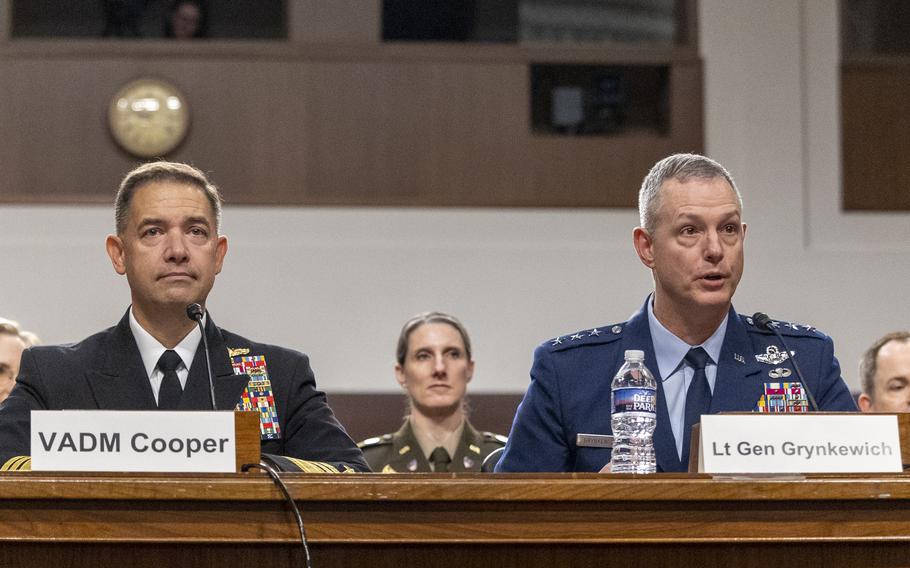
Vice Adm. Charles Cooper and Air Force Lt. Gen. Alexus Grynkewich testify Tuesday, June 24, 2025, at the Capitol in Washington during a Senate Armed Services Committee hearing on their nominations to command U.S. Central Command and U.S. European Command and Supreme Allied Commander Europe, respectively. (Eric Kayne/Stars and Stripes)
WASHINGTON — Iran retains the ability to threaten U.S. service members despite being in a weakened state following Israel’s military campaign against Tehran and American assaults on its nuclear program, the deputy commander of U.S. Central Command said Tuesday.
Navy Vice Adm. Brad Cooper, who is nominated to take command of U.S. forces in the Middle East in the summer, told senators at his confirmation hearing that the protection of troops is top of mind because Iran continues to possess “considerable tactical capability.”
“The thing I think that we need to do right now and that we are doing, with clarity, is making sure our men and women are safe in the Middle East,” Cooper said in testimony to the Senate Armed Services Committee. “That’s where our focus is today.”
Iran’s missile attack Monday on an American base in Qatar demonstrated the strength of Tehran’s remaining tactical powers, he said. The attack was rebuffed, but the risk remains for additional retaliation for this weekend’s American strikes on Iran’s major nuclear facilities.
About 40,000 troops and civilians are working for the Defense Department throughout the Middle East, including in Iraq, Bahrain, Kuwait and United Arab Emirates.
Iran’s strike Monday on al Udeid Air Base was limited in scope and was communicated beforehand, but Sen. Tom Cotton, R-Ark., warned it was likely not the end of Iran’s retribution campaign.
“It doesn’t mean that there might not be another response in a day or week or month or year or three years, and it could be missiles or rockets against our troops, or it could be trying to blow up an embassy around the world, or targeting American citizens for a terrorist attack,” he said.
Cooper agreed with that assessment. Iran’s proxies, including Hamas in the Gaza Strip and Hezbollah in Lebanon, have been degraded, but Iranian-backed militias remain intact, he said.
“We’ve got to be in a three-point stance ready to go every single day,” Cooper said. “They have and they continue to be threats to the United States.”
The Pentagon is also closely monitoring Iranian activity on the Strait of Hormuz, a 90-mile waterway connecting the Persian Gulf to the open ocean that serves as a key shipping route for oil and liquefied natural gas.
Iranian officials have threatened to mine the strait if the U.S. joined Israel’s attacks against Iran. Such a move could pin any U.S. Navy ships in the Persian Gulf and put American minesweepers in harm’s way.
Cooper said Iran has thousands of sea mines, but the U.S. also has a substantial and sufficient mine force in the region to clear them. The operation would be lengthy, he said, taking weeks or months instead of days.
“The key to this is getting to the left of the problem, establishing the deterrent posture, which we have today, and then keeping our eyes on Iranian activity, which is exactly what the U.S. military is doing today,” he said.
If confirmed, Cooper would take over as commander of CENTCOM from Army Gen. Michael Kurilla. He has served as CENTCOM’s deputy commander since February 2024 and previously led Naval Forces Central Command, the Fifth Fleet and Combined Maritime Forces.
Cooper shared his confirmation hearing Tuesday with Air Force Lt. Gen. Alexus Grynkewich, who is nominated to take over as commander of European Command and Supreme Allied Commander Europe — NATO’s top military officer — from Army Gen. Christopher Cavoli.
Grynkewich told senators that a strong NATO capable of defending Europe remained “essential to American interests.” His comments came as President Donald Trump, a skeptic of the alliance, flew to The Hague for NATO’s annual summit.
A career F-16 and F-22 fighter pilot, Grynkewich now serves as director for operations for the Joint Chiefs of Staff and previously served as commander of the Ninth Air Force and director of operations for CENTCOM.
Grynkewich on Tuesday stressed the importance of maintaining U.S. troops in Europe even as some in the Pentagon have expressed interest in directing more American forces to the Indo-Pacific region.
U.S. forces in Europe are in a “perfect position” to spring into action during crises not just on the Continent but any region in the world, he said, including in the Middle East.